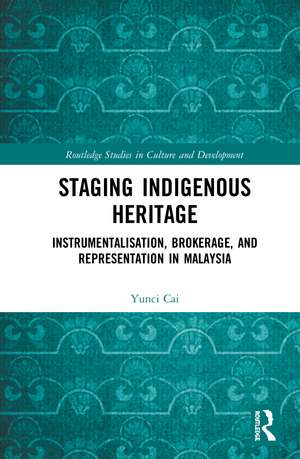Staging Indigenous Heritage: Instrumentalisation, Brokerage, and Representation in Malaysia: Routledge Studies in Culture and Development
Autor Yunci Caien Limba Engleză Hardback – 13 aug 2020
By critically examining the relationship between Indigenous tourism and development through the establishment of Indigenous cultural villages, the book addresses the complexities of adopting the ‘culture for development’ paradigm as a developmental strategy. Demonstrating that the opportunities for self-representation and self-determination can become entwined with the politics of brokerage and the contradictory dualism of culture, it becomes clear that this can both facilitate and compromise their intended outcomes. Challenging the simplistic conceptualisation of Indigenous communities as harmonious and unified wholes, the book shows how Indigenous cultures are actively forged, struggled over, and negotiated in contemporary Malaysia.
Confronting the largely positive rhetoric in current discourses on the benefits of community-based cultural projects, Staging Indigenous Heritage should be essential reading for academics and students in the fields of museum studies, cultural heritage studies, Indigenous studies, development studies, tourism, anthropology, and geography. The book should also be of interest to museum and heritage professionals around the world.
| Toate formatele și edițiile | Preț | Express |
|---|---|---|
| Paperback (1) | 258.50 lei 6-8 săpt. | |
| Taylor & Francis – 29 apr 2022 | 258.50 lei 6-8 săpt. | |
| Hardback (1) | 1001.07 lei 6-8 săpt. | |
| Taylor & Francis – 13 aug 2020 | 1001.07 lei 6-8 săpt. |
Preț: 1001.07 lei
Preț vechi: 1220.81 lei
-18% Nou
Puncte Express: 1502
Preț estimativ în valută:
191.55€ • 200.53$ • 158.50£
191.55€ • 200.53$ • 158.50£
Carte tipărită la comandă
Livrare economică 05-19 aprilie
Preluare comenzi: 021 569.72.76
Specificații
ISBN-13: 9780367148546
ISBN-10: 0367148544
Pagini: 244
Ilustrații: 28 Halftones, black and white; 28 Illustrations, black and white
Dimensiuni: 156 x 234 x 18 mm
Greutate: 0.48 kg
Ediția:1
Editura: Taylor & Francis
Colecția Routledge
Seria Routledge Studies in Culture and Development
Locul publicării:Oxford, United Kingdom
ISBN-10: 0367148544
Pagini: 244
Ilustrații: 28 Halftones, black and white; 28 Illustrations, black and white
Dimensiuni: 156 x 234 x 18 mm
Greutate: 0.48 kg
Ediția:1
Editura: Taylor & Francis
Colecția Routledge
Seria Routledge Studies in Culture and Development
Locul publicării:Oxford, United Kingdom
Public țintă
PostgraduateCuprins
Chapter 1: Introduction
Chapter 2: Historicising Indigeneity in Malaysia
Chapter 3: Capacity-building as a modern civilising mission
Chapter 4: Indigeneity as an intractable double-bind
Chapter 5: Appropriation, reinvention, and contestation of Indigenous heritage
Chapter 6: The big man as arbitrator of heritage
Chapter 7: Conclusion
Chapter 2: Historicising Indigeneity in Malaysia
Chapter 3: Capacity-building as a modern civilising mission
Chapter 4: Indigeneity as an intractable double-bind
Chapter 5: Appropriation, reinvention, and contestation of Indigenous heritage
Chapter 6: The big man as arbitrator of heritage
Chapter 7: Conclusion
Notă biografică
Yunci Cai is Lecturer in Museum Studies and Co-Director of the MA/MSc in the Heritage and Interpretation (Distance Learning) programme at the University of Leicester, UK. She is a critical heritage and museum studies scholar, specialising in the cultural politics and museologies in and of Asia.
Recenzii
"Staging Indigenous Heritage is filled with detailed ethnographic notes on various rituals and cultural practices within the four case studies that will be of interest to scholars interested in learning more about the dynamics within indigenous community groups in Malaysia. It also serves to inform future Asia development studies projects on the issues on the brokerage system." --Roslynn Ang, Independent scholar, Singapore
Descriere
Staging Indigenous Heritage examines the cultural politics of four Indigenous cultural villages in Malaysia. Cai demonstrates how they are often beset with the politics of brokerage and representation that reinforce a culture of dependency on the brokers, marginalising their intended beneficiaries.








